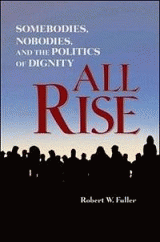(Article changed on October 22, 2013 at 16:07)
by Berrett-Koehler, 2006
This is the seventhth part of the serialization of All Rise: Somebodies, Nobodies, and the Politics of Dignity (Berrett-Koehler, 2006). The ideas in this book are further developed in my recent novel The Rowan Tree.
CHAPTER 6: RANKISM CAN BE HARMFUL TO YOUR HEALTH
Doctors are seen as somebodies. What separates them from healers is that healers bridge the gap between somebody and nobody by forming a partnership with patients based on equal dignity. I believe that affirmation of everyone's personhood is a healing interaction for patient and healer alike.
--Dr. Jeffrey Ritterman, Kaiser Permanente
The Evolving Doctor-Patient Relationship
Rankism permeates all the professions, and health care is no exception.
Historically, medicine relied on the extreme difference in rank between physicians and patients to elicit trust, compliance, and hope during times of illness. But now, emboldened by knowledge gleaned from books, support groups, and the Internet, people are transforming themselves from docile patients into informed, engaged clients. Increasingly, patients come to the doctor's office with sophisticated questions and a desire to participate in decisions regarding their treatment. The era of the "MDeity" is passing into oblivion, and the traditional model of doctor-patient relationships is gradually being replaced with one of partnership. In light of this historic shift, it's no surprise that recent studies suggest that apologies from doctors significantly reduce the incidence of malpractice lawsuits.
Another example of patients' increasing desire to have a say in health matters is the hospice movement. By championing the idea of death with dignity, hospices have enabled people to retain as much responsibility for their end-of-life care as possible rather than surrender it wholesale to health care providers.
Rankism Among Health Professionals
In the larger fraternity of white coat providers, rankism manifests itself among practitioners holding different ranks. Doctors taking advantage of interns is a ubiquitous theme on hospital TV shows. Residents find themselves both recipients of and contributors to abusive situations, and nurses have legitimate complaints about their treatment by physicians.
Within the nursing order--nurse practitioners, registered nurses, licensed volunteer nurses, and medical assistants--rankism also rears its ugly head. All of this takes its toll not only on caregivers, but ultimately on patients as well.
Relationships between practitioners of different medical modalities and orientations--allopathic, naturopathic, and the various schools of complementary and alternative medicine--are also infected with rankism. Certainly, when it comes to treatment, there are legitimate questions concerning effectiveness. But methodological standards often are not applied evenhandedly to the practices and cures advocated by different traditions. And organizations representing these traditions vie mightily with each other like medieval guilds to foster and maintain the demand for their own services rather than focusing objectively on what works best for patients.
Not surprisingly, the rankism that infects health care arises in part from the way in which its professionals are educated. The seventy-two hour shift for interns is a legendary horror story in point. Like other initiation or hazing rites, such exploitation is dangerous--in this case it adversely affects the health of the interns and increases the chance of their making medical mistakes. In addition, these "ceremonies of degradation" perpetuate a rankist environment because they predispose young physicians to repeat the behavior once they've gained membership in the exclusive club that has been tormenting them. As the training of health care providers is stripped of traditional indignities, graduates will lose the desire to impose them on the next generation.
With the advent of managed care, doctors have also become increasingly vulnerable to bureaucratic rankism. In an email dated July 8, 2005, a high-level administrator in the Office of Inspector General of the U.S. Department of Health and Human Services reported on what he hears from physicians working in health maintenance organizations:
Doctors say they feel like nobodies because that's how the health care system treats them now. Many HMOs impose restrictions on how physicians provide patient care. For example, they are under pressure from management to see no fewer than a set number of patients each day, and limits are placed on how much time they can spend with each one. Doctors were trained to see themselves as healers, yet to a health administrator they are pieceworkers. However, recently the situation is beginning to change as a result of pressure from doctors and patients.
Another manifestation of rankism to which doctors are subjected is best understood as "reverse rankism." I've heard from a number of doctors that with the loss of their former godlike status, some patients try to turn the tables on them. Armed with a few tidbits they've picked up from the Internet, they attempt to pull rank on their doctors. A brief conversation clarifying the evolving doctor-patient relationship is usually all it takes to establish a healthier partnership.
The Health Benefits of Recognition
All these forms of rankism have counterparts within other hierarchical entities such as the academic, legal, and ecclesiastic professions, as well as business, the police, and the military. However, health care practitioners bear a double burden because they must deal not only with the rankism within their own hierarchy but also the casualties created by rankist abuse in all the others.
(Note: You can view every article as one long page if you sign up as an Advocate Member, or higher).





